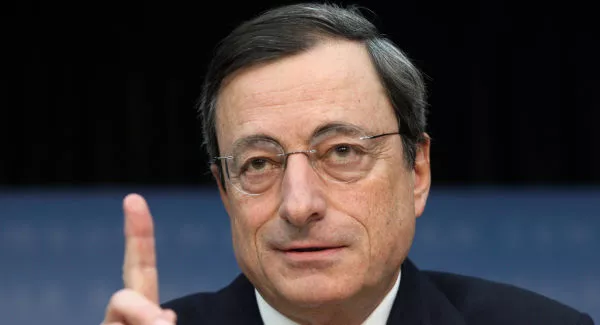As we look back on the decade since the financial crash, many phrases linger in the memory. One of the most telling, and ultimately the most successful in saving the euro, was European Central Bank president Mario Draghi’s 2012 announcement that he would do “whatever it takes” to ensure the survival of the single currency, writes John Daly.
NOW that the ECB has halved its monthly asset-buying spree, from €30bn to €15bn — and plans to have phased it out by the end of the year — the question of what comes next will dominate 2019.
Indeed, as important as the quantitative easing (QE) question is who will replace Mr Draghi’s sure hands at the EU financial tiller, when his term ends, at the end of next year. It is hard to fathom now, at a distance of only six years, just how delicate and dangerous a position the euro was in back in July, 2012.
The European sovereign debt crisis had been gathering momentum since the second half of 2009, with a number of EU member states — Greece, Portugal, Spain, Cyprus and Ireland — unable to refinance government debt, or over-indebted banks, without the assistance of the ECB or the IMF. In November, 2010, European ministers agreed a bailout for Ireland worth €85bn, followed, six months later, with the ECB bailing out Portugal.
In July, 2011, Greece was rescued a second time, as the number of unemployed across Europe reached its highest level ever. This prompted a comprehensive, €109bn package, designed to resolve the Greek crisis and prevent contagion among other European economies.
[quote]The urgency was such that IMF head, Christine Lagarde, urged countries to “act now and act together” to keep economic recovery on track, while US treasury secretary, Timothy Geithner, demanded Europe create a “firewall” to stop the crisis spreading. The bad news was incessant through the last half of 2011 and across the first six months of 2012 — spooked markets, riots in Greece, and ‘death of the eurozone’ headlines on a weekly basis.[/quote]
Into this maelstrom of financial fear and loathing stepped Draghi, to demonstrate the power of three little words. In a speech in London on July 26, 2012, Mr Draghi gave an account of the eurozone economy, where bond yields of fragile governments were soaring and doubts were growing that the EU could avert an outright disaster.
Halfway through, he made the remark that will forever define him: “Within our mandate, the ECB is ready to do whatever it takes to preserve the euro. And, believe me, it will be enough.”
The markets reacted immediately to such forthright resolve, calming investors and bringing down bond yields across the eurozone.
While it took Mr Draghi some time to untangle the constrictive economic policies of his predecessor, Jean-Claude Trichet, by 2015 he had QE ready to buy big — up to €2.5tn worth of financial assets — confined not just to government bonds, but also assets of investors.

In June, the ECB signalled its plans to wind up its historic bond-buying programme by the end of 2018. It added that the governing council expects the key ECB interest rates to remain at their present levels, at least through the summer of 2019, “and, in any case, for as long as necessary to ensure that the evolution of inflation remains aligned with the current expectations of a sustained adjustment path.”
Several factors could encourage the ECB to end purchases and normalise policy rates faster than the market expects, according to Andrew Bosomworth, Pimco’s head of portfolio management in Germany.
“These include improving economic growth, or a desire to rebuild policy flexibility, before the inevitable next recession occurs. With eurozone growth dependent on exports, especially Germany’s, the ECB will be keeping a close eye on the aging US economic expansion,” he said.
Mario Draghi’s eight-year term ends in October, 2019. Regardless of who takes the top job, Mr Draghi seems assured of a legacy honouring him as “the man who saved the euro.”






